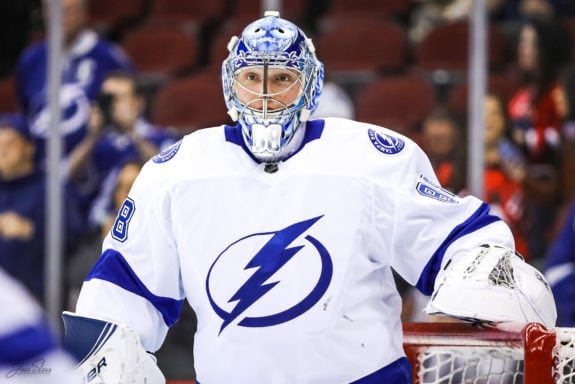The New York Islanders lost Game 7 1-0 to the Tampa Bay Lightning, losing the Eastern Conference Final series and coming up short of the Stanley Cup Final. The series itself was one that showed how close the Islanders are to the Stanley Cup, with a complete roster that forced the defending champions to a seven-game series. Unfortunately, they couldn’t beat the Lightning in the end, even with many games low-scoring and defensive games. This was a series that the better team won. The defending Stanley Cup champs found the right matchups, and they controlled the series and will play in the Stanley Cup Final as a result.
Vasilevskiy Was Dominant
Andrei Vasilevskiy is having a Stanley Cup Playoff run to remember. After a Vezina Trophy-caliber season where he posted a .925 save percentage (SV%) and a 2.33 goals-against average (GAA), the 26-year-old goaltender is posting an otherworldly .936 SV% and a 1.99 GAA in the playoffs with dominant performance after dominant performance. Arguably the best player for the Lightning in the Stanely Cup Playoffs, he has single-handedly won some of the low-scoring games for the team, most notably, the Game 7 shutout where the Lightning goaltender saved all 18 shots he faced and took the heart out of the offense as the game progressed.

The Islanders tried to test Vasilevskiy throughout the series, looking for the weaknesses that could be exposed in the world-class goaltender. Initially, the Islanders would try to shoot low shots off the pads with the hope that the taller, bigger goaltender would have a hard time making the initial save and greater difficulty making a save off the rebound of a re-directed shot. As the series progressed, the offense tried to shoot to the top shelf, where they found two goals in the Game 6 3-2 win, including the Anthony Beauvillier game-winner in overtime. The problem was Vasilevskiy held his ground throughout the series and was exceptional at eliminating second-chance shots, allowing only 11 goals in the semifinal series.
The Lightning Controlled the Center of the Ice
The Lightning defensively likes to control the center of the ice, especially when it comes to the neutral zone when their opponent is trying to establish the odd-man rush. It’s tough to accomplish, but with the speed the Lightning possess, they can force opponents to carry the puck on the wings or require the puck to be sent into the offensive zone and recovered along the boards rather than carried into the zone. The Islanders were never able to control the center ice both in the neutral zone and the offensive zone and were forced to take shots from poor angles along the boards throughout the series. The matter only worsened when some of the forwards like Brock Nelson and Kyle Palmieri started to struggle in the series, failing to create effective shots or cross-ice passes for the rest of the shift. The Islanders’ offense was hapless in large part because of the coaching and talent defensively of their opponent.
Islanders Forward Depth Met Lightning Defensive Depth
Throughout the regular season, the Islanders failed to find scoring depth, and the offense as a whole struggled, scoring only 2.71 goals per game. The first two rounds of the Stanley Cup Playoffs couldn’t have been any different, with the team finding goals on all four of their forward lines and overwhelming the Pittsburgh Penguins and Boston Bruins defenses in the process. Even forwards who struggled to find the back of the net in the regular season, like Josh Bailey, who only scored eight goals in the regular season, scored six times in the playoff run.

The Islanders were piling on the goals from later line scorers like Jean-Gabriel Pageau and Palmieri, but they both fell flat in the semifinal against the Lightning, both failing to score the entire series. The Lightning are known for possessing one of the best defensemen in the game, former Norris Trophy winner Victor Hedman, who was dominant in the 2019-20 Eastern Conference Final against the same club, but this series, the entire defensive unit stepped up and took over each game. Whether it was Mikhail Sergachev, who continues to emerge as one of the best young defensemen in the NHL, or veterans like Ryan McDonough and David Savard, the Islanders could never overwhelm the opponent’s defense with the depth controlling the pace of the play and eliminating many opportunities in the series.
Islanders Defense Played Well but Were Pressured in Their Zone
The Islanders’ defensive pairing led the team all season and through the Stanley Cup Playoffs, with great play across the ice, and incredible awareness, which was highlighted with the Ryan Pulock blocked shot to seal the Game 4 3-2 victory. One of the weaknesses that the defensive unit exposed in the second round against the Bruins, which was exploited multiple times in the semifinal, was the inability to clear the puck out of the defensive zone. Specifically, the defensemen were susceptible to allowing turnovers when the opponent would pressure them in around the net and force the defensemen to make a quick decision.
Multiple times in the semifinal series, the Lightning would pressure the Islanders in their own zone and force quick turnovers as a result. The Lightning were not only able to find quick scoring chance, but they would also contain the puck in the Islanders zone for an extended period of time during the game. The most notable instances of this weakness being exposed were in Game 5, where the final score was 8-0 in large part because of the pressure created and Game 6 where Adam Pelech tried to clear the puck around the boards, but Brayden Point intercepted the puck to retain possession and score the opening goal of the game. The defensemen needed to effectively start rushes off the turnover, but by the time the adjustments were made by the coaching staff, it was too late.
Where Do the Islanders Go From Here?
This season was a reminder of how close this team is to winning the Stanley Cup. The Islanders were a few plays away from playing in the Stanley Cup Final, and the way they matched up against the defending Stanley Cup champions allowed everyone to see the title contender that is being built in Long Island. The problem now comes with an offseason with a lot of questions and positions to address. The Islanders will have to first maneuver the upcoming Expansion Draft, which will likely take away a veteran on the backend of the roster. The team also has to figure out what direction they want to head in free agency with many pending free agents and an aging roster. It will be interesting to see what the team looks like next season but based on the steps taken in the past few seasons, the Stanley Cup might be a few pieces away.